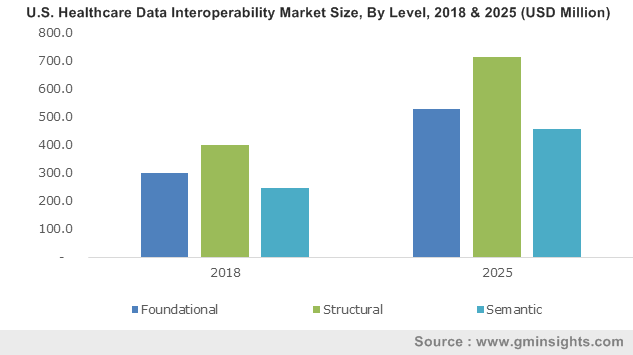Cloud-based healthcare data interoperability market to accumulate massive returns by 2025
Publisher : Fractovia | Published Date : 2019-06-19Request Sample
Increasing digitalization and adoption of electronic health records (EHR) will drive healthcare data interoperability market share in the upcoming years. Over the past few years, hospitals and physicians have moved from paper-based to electronic health records for recording and exchanging patient information.
U.S. Healthcare Data Interoperability Market Size, By Level, 2018 & 2025 (USD Million)

According to the Healthcare Information and Management Systems Society (HIMSS), over 95% of hospitals and nearly 90% of independent physicians have adopted EHR systems. With varied systems being used, interoperability has become a feature much in demand in today’s health industry.
The technology enables better workflows and reduced ambiguity, allowing efficient data transfer among EHR systems and healthcare stakeholders. The demand for interoperability is expected to grow in the coming years with advancements in healthcare technology, which will propel healthcare data interoperability market size.
Nowadays, patients receive care from a series of clinics, independent doctors or hospitals. These individual interactions make up for a vast medical history containing past symptoms, procedures, allergies, complications, etc., that needs to be recorded for future reference.
Implementing advanced interoperability to record and understand clinical data will help healthcare organizations better prevent errors due to missing or incomplete patient medical history. With real-time information, hospitals can cut down on repetitive tasks and significantly increase margins by treating more patients and increasing their quality of care.
Growing investments and advancements in healthcare sector will drive healthcare data interoperability market share. For instance, in 2019, the Hawaii Health Information Exchange (HHIE), as part of its $2.5 million investment, announced developing a community master patient index to facilitate care provider’s access to patients' most updated health information.
The U.S. healthcare data interoperability market will grow significantly over the coming years. According to the West Health Institute (WHI), the ability of system interoperability to exchange data could save the U.S. healthcare system over $30 billion each year. The American Hospital Association has recently claimed that interoperability has given patients improved healthcare assurance as care providers’ decisions are based on the best, most updated information available.
The technology gives organizations the ability to save time on individual patients by leveraging accurate medical records and initiating appropriate steps at the right time. The U.S. government is encouraging healthcare industry to develop new technologies while industry players are making efforts to develop new healthcare interoperability software. These initiatives will help U.S. healthcare data interoperability market expand in the forthcoming years.
With regard to the high cost of EHR, the use of cloud technologies has increased considerably in recent years. It has helped customers to reduce cost on hardware systems, its installation and maintenance, and has improved the speed of access to data and clinical information. Cloud-based software has enabled the exchange of data globally without interruptions which resulted in easy flow of information.
Cloud-based interoperability systems use both cryptographic and non-cryptographic approach as well as follow some strict security laws. Rapid advancements and adoption of e-health cloud-based systems will drive cloud-based healthcare data interoperability market size. Global Market Insights, Inc., claims that the cloud-based segment held close to 64% in healthcare data interoperability industry share in 2018 and will grow majorly over 2019-2025.
Recently in 2019, Nashville-based health IT vendor, Change Healthcare announced that it will be offering free interoperability services that will run on the Amazon Web Services (AWS) cloud. These services will deliver features like identity management, record locator service, and document retrieval solution with patient privacy protection and support a comprehensive range of use cases.
In addition to this, the University of Pittsburgh Medical Center (UPMC) is investing in a cloud-based healthcare operating system (hcOS) designed to make it easy for app developers to build software solutions that access clinical data and systems, improve healthcare interoperability and break down data silos.
Interoperability addresses the need for exchange of information in healthcare while simultaneously increasing the quality of care received, improving healthcare efficiency as well as financial incentivization. Cloud-based eHealth record systems are revolutionizing current market trends.
Global Market Insights, Inc., estimates healthcare data interoperability market size to exceed USD 3.5 billion by 2025.